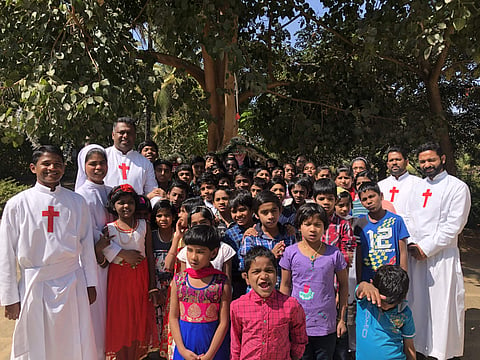

Located on the outskirts of Bengaluru, near Sarjapur Road, this school and its residential facility serve as a lifeline to many HIV positive children in Karnataka. What started as a home for destitute and orphaned children in 1996, Sneha Care Home later evolved into a mission to care for HIV positive children. Explaining why they chose to empower these kids with education and basic needs, Father Jaison Mathew, Director of the school, says, "In the 1990s, when we set off on our journey to take care of orphans, we also found a few HIV positive patients among them. None of their family members would come forward to take care of them. In 2008, we started Sneha Care Home and Shining Star School with a residential facility for HIV positive children. Initially, we had only 20 children, but today, we have over 60 children studying with us. From providing education to food to medical facilities, everything is taken care of by us. Right now, our campus houses a school, a residential facility and a nursing home for children aged 5 to 13."
With an aim to provide life enrichment, vocational training and community-oriented courses, they have based their educational system on the National Institute of Open Schooling (NIOS) model. "We have adopted the NIOS system because children who come to study with us are from a poor background. By the time they are out of school, they should be ready to work for different companies based on their skills. While we don't include any difficult courses, there are courses like tailoring, crafts, candle making, dairy farming and agriculture for those 14 years and above. Apart from this, we have begun sports programmes with the support of the Bangalore Schools Sports Foundation, under which they host a programme every year called 'Champion in Me'," says Fr Mathew.
Aside from their centre in Bengaluru, there are about 90 children aged 14 years and above who are studying and staying in another centre in Krishnagiri, Tamil Nadu. "After passing their class X exams, they can either continue to pursue higher studies or begin working. For higher studies, we provide complete financial support and if they want to work, we provide them with job placements," he says, adding, "Like every other school, we follow the guidelines of the Child Welfare Committee (CWC). The teachers make sure that these children spend their vacations at home, either with their parents or grandparents." The school either admits children specially referred by hospitals and sometimes, by family or friends. Fr Mathew, who has been working with the institute for over 10 years, states that it is either poverty or lack of knowledge that forces parents to leave their children in their school. "In most cases, the parents are poor and they have three to four children to care for. They cannot afford to provide nutritious food or proper medical care to their HIV positive child. Thus, they leave this child in our institute instead of allowing the children to grow together."
As an institution that deals with one of the most sensitive issues, they have developed a different process of HIV disclosure and methodology of approaching children. "We disclose their HIV status when they are as young as 8 years old. It is good to tell them about the disease and how they need to take care of themselves early on rather than give them a shock when they are older. Initially, they don't understand, but as they grow older, they become more aware. There is no question of ostracising them as it is a health issue like any other. With proper food, good hygiene, physical exercises and medical care, we can help them live a long and normal life. We provide education and every manner of care for them until they are 18 years old," states Fr Mathew.
